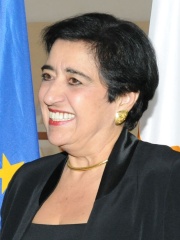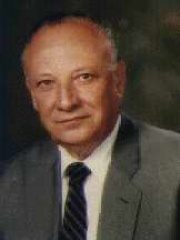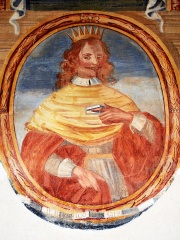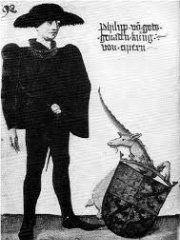
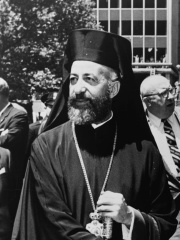

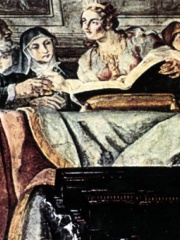


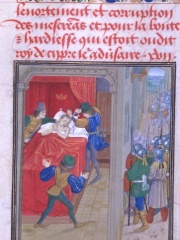
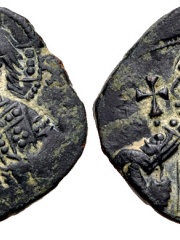
The Most Famous
POLITICIANS from Cyprus
This page contains a list of the greatest Cypriot Politicians. The pantheon dataset contains 19,576 Politicians, 35 of which were born in Cyprus. This makes Cyprus the birth place of the 80th most number of Politicians behind New Zealand, and Indonesia.
Top 10
The following people are considered by Pantheon to be the top 10 most legendary Cypriot Politicians of all time. This list of famous Cypriot Politicians is sorted by HPI (Historical Popularity Index), a metric that aggregates information on a biography's online popularity. Visit the rankings page to view the entire list of Cypriot Politicians.

1. Ptolemy XII Auletes (117 BC - 51 BC)
With an HPI of 76.02, Ptolemy XII Auletes is the most famous Cypriot Politician. His biography has been translated into 48 different languages on wikipedia.
Ptolemy XII Neos Dionysus (Ancient Greek: Πτολεμαῖος Νέος Διόνυσος, romanized: Ptolemaios Neos Dionysos, lit. 'Ptolemy the new Dionysus' c. 117 – 51 BC) was a king of the Ptolemaic Kingdom of Egypt who ruled from 80 to 58 BC and then again from 55 BC until his death in 51 BC. He was commonly known as Auletes (Αὐλητής, "the Flautist"), referring to his love of playing the flute in Dionysian festivals. A member of the Ptolemaic dynasty, he was a descendant of its founder Ptolemy I, a Macedonian Greek general and companion of Alexander the Great. Ptolemy XII was an illegitimate son of Ptolemy IX by an uncertain mother. In 116 BC, Ptolemy IX became co-regent with his mother, Cleopatra III. However, due to a civil war against his mother and his brother, Ptolemy X, he was exiled in 107 BC. Cleopatra III sent her grandsons to Kos in 103 BC. They were captured by Mithridates VI of Pontus probably in 88 BC. After the killing of his cousin Ptolemy XI, Ptolemy XII was recalled from Pontus and proclaimed pharaoh, while his brother, also named Ptolemy, was installed as king of Cyprus. Ptolemy XII married his relative Cleopatra V, who was likely one of his sisters or cousins; they had at least one child together, Berenice IV, and Cleopatra V was likely also the mother of his second daughter, Cleopatra VII. The king's three youngest children – Arsinoe IV, Ptolemy XIII, and Ptolemy XIV – were born to an unknown mother. Ptolemy XII's uncle Ptolemy X had left Egypt to Rome in the event there were no surviving heirs, making Roman annexation of Egypt a possibility. In an effort to prevent this, Ptolemy XII established an alliance with Rome late into his first reign. Rome annexed Cyprus in 58 BC, causing Ptolemy of Cyprus to commit suicide. Shortly afterwards, Ptolemy XII was deposed by the Egyptian people and fled to Rome, and his eldest daughter, Berenice IV, took the throne. With Roman funding and military assistance, Ptolemy XII recaptured Egypt and had Berenice IV killed in 55 BC. He died the next year and was succeeded by Cleopatra VII and her brother Ptolemy XIII as joint rulers.

2. Makarios III (1913 - 1977)
With an HPI of 73.84, Makarios III is the 2nd most famous Cypriot Politician. His biography has been translated into 54 different languages.
Makarios III (born Michael Christodoulou Mouskos; 13 August 1913 – 3 August 1977) was a Greek Cypriot prelate and politician who served as Archbishop of the Church of Cyprus from 1950 to 1977 and as the first president of Cyprus between 1960 and July 1974, with a second term between December 1974 and 1977. He is widely regarded as the founding father or "Ethnarch" of the Republic of Cyprus, leading its transition from British colonial rule.

3. Nicos Anastasiades (b. 1946)
With an HPI of 71.01, Nicos Anastasiades is the 3rd most famous Cypriot Politician. His biography has been translated into 65 different languages.
Nicos Anastasiades (Greek: Νίκος Αναστασιάδης [ˈnikos anastasiˈaðis]; born 27 September 1946) is a Cypriot politician and businessperson, who served as the seventh president of Cyprus from 2013 to 2023. Previously, he was the leader of Democratic Rally between 1997 and 2013 and served as Member of Parliament from Limassol between 1981 and 2013. Having served in parliament for over three decades, Anastasiades was elected to the presidency in 2013 amid a deep economic crisis. He responded by negotiating a bail-out agreement with the Troika group, consisting of the European Commission, European Central Bank and International Monetary Fund. This required the island to generally cut public spending, though his administration remediated this by attracting significant foreign investment and then increasing the minimum wage, improving the economy. He was re-elected in 2018. Anastasiades' foreign policy involved the greatest unification talks since 2004, but ultimately failed to reach an agreement. Another considerable legacy of his presidency is his longstanding relationship with Russia, dating back prior to his election due to his law firm that focussed on Russian clientele. Anastasiades signed several agreements to promote closer economic and financial ties with Moscow, turning Cyprus into a vehicle for Russian oligarchs to register their assets there and avoid international sanctions implemented since 2014. Coupled with the controversial investment-for-citizenship program, this created a perception of corruption, something that his supporters have denied, and he reversed his policies drastically following the Russian invasion of Ukraine. He was mentioned in the Panama Papers, Troika Laundromat, and Cyprus Papers leaks.

4. Charlotte, Queen of Cyprus (1442 - 1487)
With an HPI of 69.84, Charlotte, Queen of Cyprus is the 4th most famous Cypriot Politician. Her biography has been translated into 28 different languages.
Charlotte (28 June 1444 – 16 July 1487) was the Queen of Cyprus from 1458 until 1464. She was the eldest and only surviving daughter of King John II of Cyprus and Helena Palaiologina. At the age of 14, she succeeded to the Cypriot throne upon the death of her father. Her illegitimate half-brother, James, challenged her right to the crown. With the support of the Egyptians, he forced her to flee the island in 1463, and he was later crowned king. She made a military attempt to regain her throne, but was unsuccessful, and died childless in Rome.
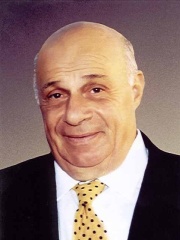
5. Rauf Denktaş (1924 - 2012)
With an HPI of 68.30, Rauf Denktaş is the 5th most famous Cypriot Politician. His biography has been translated into 51 different languages.
Rauf Raif Denktaş (27 January 1924 – 13 January 2012) was a Turkish Cypriot politician, barrister and jurist who served as the founding president of Northern Cyprus. He occupied this position as the president of the Turkish Republic of Northern Cyprus between the declaration of the de facto state by Denktaş in 1983 and 2005, as the president of the Turkish Federated State of Cyprus between 1975 and 1983 and as the president of the Autonomous Turkish Cypriot Administration between 1974 and 1975. He was also elected in 1973 as the Vice President of the Republic of Cyprus.

6. Tassos Papadopoulos (1934 - 2008)
With an HPI of 67.89, Tassos Papadopoulos is the 6th most famous Cypriot Politician. His biography has been translated into 50 different languages.
Efstathios "Tassos" Nikolaou Papadopoulos (Greek: Ευστάθιος (Τάσσος) Νικολάου Παπαδόπουλος; 7 January 1934 – 12 December 2008) was a Cypriot politician and barrister, who served as President of Cyprus from 2003 to 2008. An experienced member of the Makarios III’s cabinet, Papadopoulos took charge of the country’s parliament in 1976, two years after the Turkish invasion, and became one the island’s most notable proponents of a hardline position on Cypriot reunification. It was this sentiment that he successfully employed as a candidate in the 2003 presidential election, after which he directed the population to reject the Annan Plan. However, his inability to negotiate an alternative contributed to his failure to win re-election in 2008, despite generally maintaining high approval ratings during his presidency.

7. John II of Jerusalem (1260 - 1285)
With an HPI of 66.57, John II of Jerusalem is the 7th most famous Cypriot Politician. His biography has been translated into 23 different languages.
John I (French: Jean; c. 1268 - 20 May 1285) was King of Cyprus and, in contention with Charles I of Anjou, of Jerusalem from 1284 to 1285. John was the eldest surviving son of Hugh III, king of Cyprus and Jerusalem, and Isabella of Ibelin. Hugh died on 3 March 1284 and John was crowned the next king of Cyprus in Nicosia on 11 May. He was then aged about 17, and was handsome and delicate. The historian Steven Runciman says that John immediately sailed to Tyre, where he was crowned king of Jerusalem. According to the historian Hans E. Mayer, there is no basis in sources that this coronation ever took place. On the mainland, John was recognized as king only in Tyre and Beirut, which were ruled by his aunt Margaret and brother Guy, respectively. Acre, political centre of the Kingdom of Jerusalem, recognized Charles of Anjou. John died on 20 May 1285, almost exactly a year after his coronation, leaving the crown to his younger brother Henry II.

8. Peter I of Cyprus (1328 - 1369)
With an HPI of 66.01, Peter I of Cyprus is the 8th most famous Cypriot Politician. His biography has been translated into 26 different languages.
Peter I (9 October 1328 – 17 January 1369) was King of Cyprus and titular King of Jerusalem from his father's abdication on 24 November 1358 until his death in 1369. He was invested as titular Count of Tripoli in 1346. As King of Cyprus, he had some military successes, but he was unable to complete many of his plans due to internal disputes that culminated in his assassination at the hands of three of his knights.

9. Isaac Komnenos of Cyprus (1155 - 1196)
With an HPI of 65.74, Isaac Komnenos of Cyprus is the 9th most famous Cypriot Politician. His biography has been translated into 25 different languages.
Isaac Doukas Komnenos (or Ducas Comnenus, c. 1155 – 1195/1196) was a claimant to the Byzantine Empire and the ruler of Cyprus from 1185 to 1191. Contemporary sources commonly refer to him as the emperor of Cyprus. He lost the island to King Richard I of England during the Third Crusade.
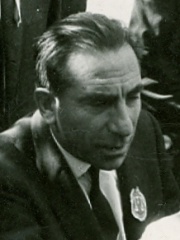
10. Alparslan Türkeş (1917 - 1997)
With an HPI of 65.27, Alparslan Türkeş is the 10th most famous Cypriot Politician. His biography has been translated into 28 different languages.
Alparslan Türkeş (Turkish pronunciation: [alˈpaɾsɫan tyɾˈceʃ]; 25 November 1917 – 4 April 1997) was a Turkish politician, who was the founder and president of the Nationalist Movement Party (MHP) and the Grey Wolves (Ülkü Ocakları). He ran the Grey Wolves training camps from 1968 to 1978. More than 600 people are said to have fallen victim of political murders by the Grey Wolves between 1968 and 1980. He represented the far-right of the Turkish political spectrum. He was and still is called Başbuğ ("Leader") by his devotees.
People
Pantheon has 35 people classified as Cypriot politicians born between 117 BC and 1973. Of these 35, 12 (34.29%) of them are still alive today. The most famous living Cypriot politicians include Nicos Anastasiades, Nikos Christodoulides, and Ersin Tatar. The most famous deceased Cypriot politicians include Ptolemy XII Auletes, Makarios III, and Charlotte, Queen of Cyprus. As of April 2024, 2 new Cypriot politicians have been added to Pantheon including Tufan Erhürman, and Dimitrios Droutsas.
Living Cypriot Politicians
Go to all RankingsNicos Anastasiades
1946 - Present
HPI: 71.01
Nikos Christodoulides
1973 - Present
HPI: 64.70
Ersin Tatar
1960 - Present
HPI: 62.49
Mustafa Akıncı
1947 - Present
HPI: 62.43
Stella Kyriakides
1956 - Present
HPI: 56.65
Ünal Üstel
1955 - Present
HPI: 56.42
Androulla Vassiliou
1943 - Present
HPI: 56.22
Erato Kozakou-Marcoullis
1949 - Present
HPI: 55.99
Tufan Erhürman
1970 - Present
HPI: 54.67
Sibel Siber
1960 - Present
HPI: 49.70
Markos Kyprianou
1960 - Present
HPI: 47.29
Dimitrios Droutsas
1968 - Present
HPI: 42.13
Deceased Cypriot Politicians
Go to all RankingsPtolemy XII Auletes
117 BC - 51 BC
HPI: 76.02
Makarios III
1913 - 1977
HPI: 73.84
Charlotte, Queen of Cyprus
1442 - 1487
HPI: 69.84
Rauf Denktaş
1924 - 2012
HPI: 68.30
Tassos Papadopoulos
1934 - 2008
HPI: 67.89
John II of Jerusalem
1260 - 1285
HPI: 66.57
Peter I of Cyprus
1328 - 1369
HPI: 66.01
Isaac Komnenos of Cyprus
1155 - 1196
HPI: 65.74
Alparslan Türkeş
1917 - 1997
HPI: 65.27
Glafcos Clerides
1919 - 2013
HPI: 64.97
Henry I of Cyprus
1217 - 1253
HPI: 64.57
John II of Cyprus
1418 - 1458
HPI: 63.49
Newly Added Cypriot Politicians (2025)
Go to all RankingsOverlapping Lives
Which Politicians were alive at the same time? This visualization shows the lifespans of the 8 most globally memorable Politicians since 1700.







